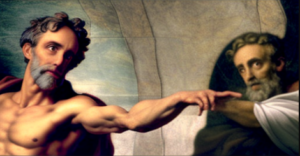 This is an old and tiresome topic that came up in a conversation yesterday, and it led me in a strange mental direction.
This is an old and tiresome topic that came up in a conversation yesterday, and it led me in a strange mental direction.
The question comes in various forms.
- Is religion necessary for people to be good?
- Can you have a system of ethics without assuming the existence of God?
- Do atheist ethical systems make sense? Etc.
There’s an old saying to the effect that when a question doesn’t admit of a ready answer, maybe there’s something wrong with the question. I think there’s some of that here.
For example, “is religion necessary?” might be akin to asking “are emotions necessary?” That is, man is an essentially religious animal, just as he is an emotional animal, so asking about “man without religion” is somewhat of a broken question. You could argue that there’s no such thing as “man without religion.”
Experience seems to show that as traditional religions fade, other things become more religious — as if we’re going to have our religion one way or another. It’s either going to be considered and thoughtful and organized, or it’s going to seep out in strange and ugly ways, but it’ll be there whether you like it or not.
This is not to say that every individual is religious. That would simply make the word “religion” too loose to have any real meaning. So the question has to be more precise. E.g., the question “can a non-religious culture be good?” might boil down to “is a non-religious culture stable?” You could also ask, “can a non-religious person be good?”
In either event, a broad form of the question isn’t very useful.
When it comes to God, it gets even more difficult.
I used to be very frustrated with Jordan Peterson’s waffling over whether he believes in God. It seems like a simple enough question, but the more I’ve listened to his on-going struggle, the more I’ve understood where he’s coming from.
What does “belief” mean?
For example, a person might claim that he doesn’t believe other minds exist, but does he really believe that? That’s a developmental stage that every human goes through (about age 2, I think). It’s hard-wired into our brains. Just because a person has watched a silly YouTube video and thinks he believes other minds don’t exist doesn’t necessarily mean he actually believes it in any meaningful sense. In other words, there is an element of belief that’s more than what you choose to say to yourself and others.
A person can say all sorts of things about what he believes, and he can mean them when he says them, but that doesn’t make them true. A person might believe he has no fear of death, but biology takes over at some point. You fear death whether you think you do or not.
Could something similar be true with God?
Also, “God” is a complicated concept. Let’s say, just for the sake of argument, that “God” means 100 things, including spirit, infinite, eternal, unchangeable, the source of being, all-powerful, etc. If you say “does a person need to believe in God to be good,” how many of those 100 things are we talking about?
And what does “good” mean? At a minimum, it means that the person has a value system and follows it. But a value system has a hierarchy, and something has to be at the top of that hierarchy. What if one of those 100 things that define God is “the top of the value hierarchy”? It would be impossible to be “good” and not believe in a value hierarchy, so it would be impossible to be “good” and not believe in at least one of the things that defines God.
I know that sounds like a trite observation. Many of the things that define God (order, wisdom, logic, purpose) are necessary in any sensible system of any kind, so what’s the point?
The point is that I believe you’re still faced with an important question. What are all those things that are assumed in the word “good”? Make a list, then compare that list with what defines God. There will be some common elements. So in order to be “good” you have to believe in some of the things that define God.
Well … how many? At what point does that constitute “believing in God”?
Or look at it from the other direction. If someone believes that God is changeable, does that mean he doesn’t believe in God? How many of the 100 things that define God does a person have to believe in order to “believe in God”?
It’s not a simple question.
So when Jordan Peterson irritatingly asks “what do you mean by ‘good’? What do you mean by ‘believe’? What do you mean by ‘God’?” … he has a point.
 This is an old and tiresome topic that came up in a conversation yesterday, and it led me in a strange mental direction.
This is an old and tiresome topic that came up in a conversation yesterday, and it led me in a strange mental direction.